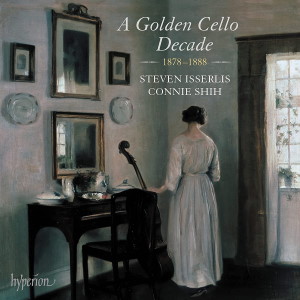
A Golden Cello Decade 1878-1888
Max Bruch (1838-1920)
Kol Nidrei, Op.47 (1881)
Richard Strauss (1864-1949)
Cello Sonata in F major, Op.6 (1881, original version)
Antonín Dvořák (1841-1904)
Four Romantic Pieces, Op.75 (1887) arr. Steven Isserlis
Luise Adolpha Le Beau (1850-1927)
Cello Sonata in D major, Op.17 (1878)
Ernst David Wagner (1806-1883)
Kol Nidrei; No.1 of Schir Zijon, Op.44
Isaac Nathan (1790-1864)
Oh! weep for those arr Steven Isserlis
Steven Isserlis (cello)
Connie Shih (piano)
Olivia Jageurs (harp)
rec. 2021, Henry Wood Hall, London
HYPERION CDA68394 [76]
As Steven Isserlis writes in his chatty, droll and very readable notes, he’d have selected the more obvious period of 1880-1890 for his cellistic decade, which includes the sonatas of Grieg and Strauss (both 1883) and Brahms (his Second), as well as the second printing of Franck’s sonata where the cello alternative was specified. However, that would have been to omit the 1878 Le Beau sonata, the existence of which was brought to his attention by a Twitter correspondent and clearly excited his interest, hence its inclusion. There’s also a bit of satelliting around Kol Nidrei, of which more later.
He and Connie Shih actually play Strauss’ 1881 original version of the sonata, which Strauss pretty much disowned, rewriting the second and third movements, and which was finally published as late as 2020. They are vibrancy itself in the first movement and draw out the colour in the central Larghetto through subtle inflexions and phrasing, their formidable ensemble working to the work’s advantage. They cut the finale’s exposition repeat, which doesn’t concern me, and judge the tempi wisely. You could easily add this recording to that of the revised version which Isserlis recorded two decades ago with Stephen Hough on RCA, which remains the primary recommendation of course, this Hyperion traversal serving as more of an appendix.
Luise Adolpha Le Beau was German, despite her name, and studied with Kalliwoda, Rheinberger and Clara Schumann – with whom Le Beau didn’t get on – and after an initial tour as a pianist, she seems to have struggled in a male-dominated profession. Her sonata succeeds in two important ways; it’s mellifluous and it’s compact. It looks back a little at Mendelssohn, from whom one suspects Le Beau extracted a fair quotient of her lyric gift. Isserlis unleashes some fine bowing in the first movement, exploring the sonata’s graceful ease as well as its more romantically assertive elements. He and Shih locate a touching intimacy in the slow movement, fine interplay drawing its wistful lyricism to the fore, and they deal well with the jaunty finale, which may well encode a moment or two of naiveté , as Isserlis suggest, but it’s a winning naiveté.
Isserlis has undertaken the arrangement for cello of Dvořák’s Four Romantic Pieces. I won’t quibble as it works quite well though I will note that it takes on a necessarily weightier melancholy and sounds more freighted for the lower instrument than in the familiar version for violin. It very slightly changes the character of at least one of the pieces.
Which brings us to Kol Nidrei. Bruch’s familiar version is recorded, in which Connie Shih proves a rightly assertive partner, and where you’ll find harpist Olivia Jageurs’s adding her rapt eloquence; Isserlis couldn’t do without the harp. Two pieces are presented as ‘Footnotes’. Ernst David Wagner was a Polish-German organist and composer, and he too wrote a much shorter though expressive version of Kol Nidrei. The final piece is Oh! weep for those by Isaac Nathan, which was the source material for Bruch’s setting. Fittingly, Isserlis has arranged it for performance, simplifying it slightly, and playing it with dignity. Nathan is well-known for two things: firstly, he was run over and killed by a horse-drawn tram and, second, one of his descendants was Charles Mackerras.
There are two things going on here. The first is the two sonatas and the Four Romantic Pieces which form the basis of the programme. The second is the Jewish theme, presented in extrapolated form by Bruch, then clarified by Wagner and Nathan. These programmatic elements never bisect but can be enjoyed separately.
Isserlis is on top form here, playing with lucid intelligence, variegated bow weight and expressive intensity. Shih takes on her burdens with scrupulous clarity and together they form an immaculate team. A fine recording completes the pleasures of this slightly odd-looking but ultimately attractive disc.
Jonathan Woolf
Help us financially by purchasing through




















